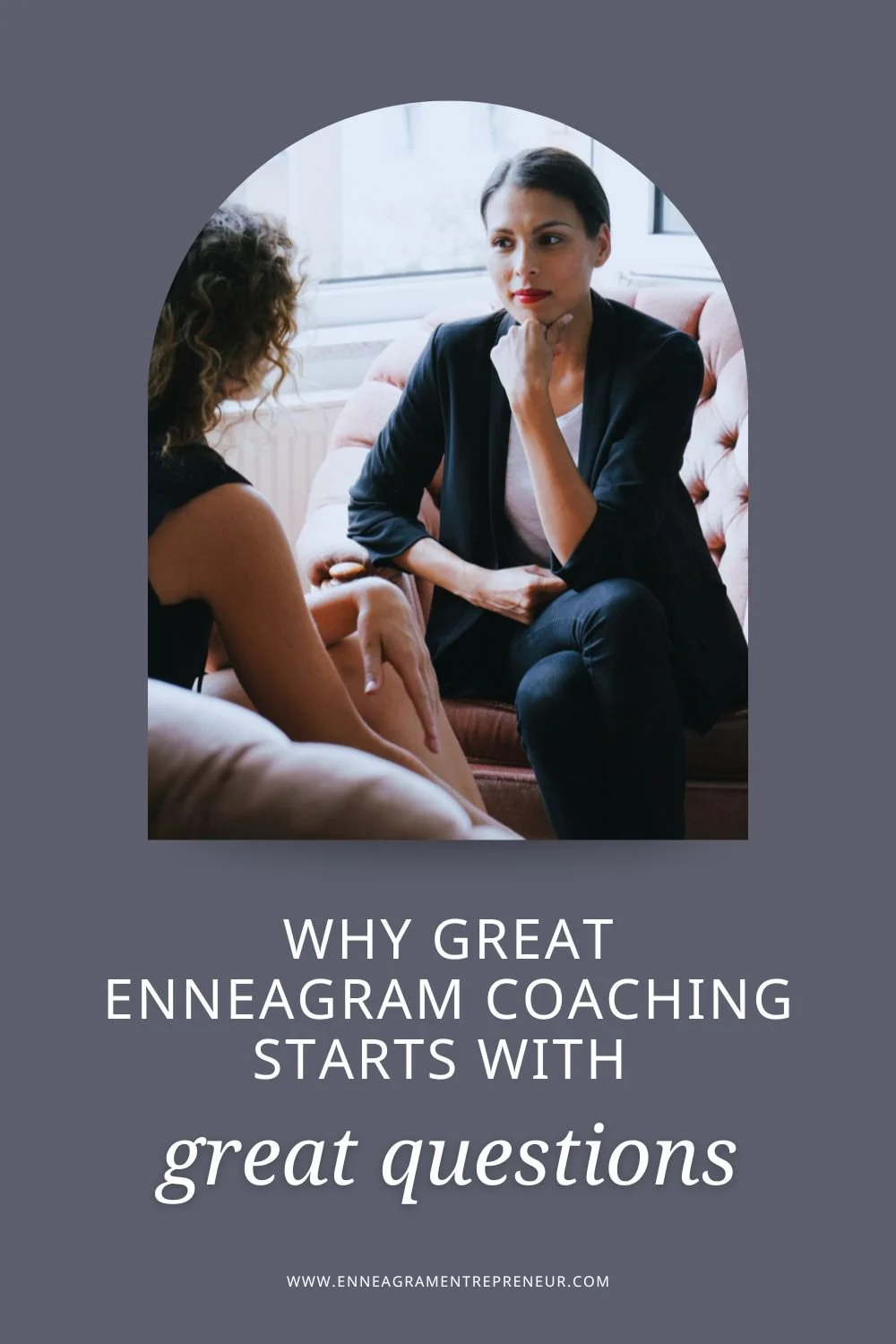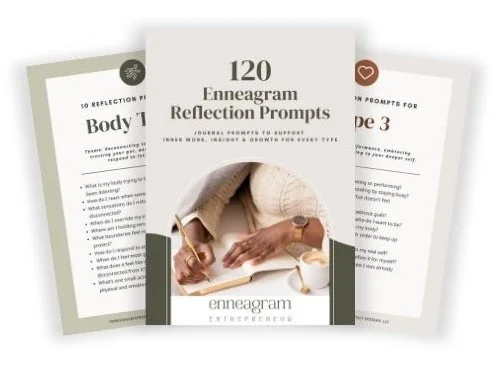Why Great Enneagram Coaching Starts with Great Questions
And how to use reflection prompts to help your clients grow with clarity and confidence
As an Enneagram practitioner, you probably already know this: insight doesn’t come from giving your client the answer.
It comes from asking the right question; the one that cuts through surface-level patterns and opens the door to something deeper.
That’s why great Enneagram coaching doesn’t start with information.
It starts with curiosity.
When we offer our clients powerful, well-timed questions, especially ones grounded in their type structure or instinctual center, we create space for growth that’s both personal and lasting.
Reflection prompts, when used intentionally, help clients uncover their own truth, name what’s been hiding under the surface, and move forward with more clarity.
Why Prompts Work So Well in Enneagram Coaching
If you’ve ever had a client say, “I’ve never thought of it that way before,” after you asked a question, then you already know the power of a well-placed prompt.
• They spark self-awareness without putting the coach in the role of “fixer.”
Prompts allow the client to make their own discoveries, without you needing to give advice, solve problems, or interpret everything for them.
Instead of explaining the Enneagram to your client, you’re helping them experience it from the inside out.
• They guide the session without dominating it.
A great prompt offers just enough direction to anchor a conversation, without hijacking the client’s process. It opens a door and lets the client decide what they’re ready to walk through—often surfacing insights that wouldn’t have come from direct questioning alone.
• They support between-session growth through journaling and reflection.
Giving clients prompts as homework keeps the inner work going even when they’re not in session with you. It helps them stay connected to what came up during your time together, while deepening their ability to notice patterns, name emotions, and reflect on choices.
• They invite emotional honesty, especially from clients who tend to avoid it.
Many clients (depending on their type or instinct) struggle to access or express their emotions clearly. Prompts offer a safe, non-judgmental way to explore what’s happening under the surface, especially for those who intellectualize, minimize, or over-accommodate.
When to Use Reflection Prompts in Enneagram Work
Whether you’re coaching one-on-one, running a group, or leading a workshop, prompts can be woven into your work in ways that feel natural and impactful. Here are a few ideas:
At the start of a session, to set a tone of reflection and help the client focus inward
When a client feels stuck or vague, to interrupt autopilot responses and invite clarity
As between-session homework, to keep the client engaged and reflecting outside of sessions
In group settings, to encourage open discussion and self-awareness
In typing sessions, to explore underlying motivations without leading the client
You don’t need to rely on a script, but having a bank of thoughtful, type-aligned prompts can help you feel more confident and responsive in your coaching.
Why Type-Specific Questions Matter
Generic questions are a decent starting point, but the Enneagram is anything but generic. Each type carries its own core fears, patterns, and blind spots, and questions should reflect that.
A well-placed question can gently challenge a client’s defenses, bring an unconscious pattern to light, or help them access something they’ve been avoiding. But only if it speaks their language.
Here are a few examples of how a type-specific prompt might sound:
Type 1: What would it look like to loosen the rules today and trust yourself anyway? (Invites self-compassion and flexibility)
Type 2: What do you need right now that you’re hoping someone else will notice? (Shifts focus from others back to self-awareness)
Type 3: Who are you when you’re not performing, producing, or being “impressive”? (Helps disconnect identity from achievement)
Type 4: What’s something ordinary in your life that you’ve been overlooking or undervaluing? (Grounds emotional intensity in present reality)
Type 5: What’s one thing you’ve been holding back from sharing, and what would it take to offer it? (Encourages engagement and emotional risk)
Type 6: What decision would you make if you fully trusted yourself? (Supports inner authority and grounded courage)
Type 7: What feeling or situation have you been trying to avoid by staying busy? (Invites presence with discomfort)
Type 8: What part of you feels most vulnerable, and how might that part need care instead of protection? (Opens space for tenderness and trust)
Type 9: What do you want right now that you’ve been minimizing or deferring? (Reconnects them with personal desire and agency)
Why Center-Based Prompts Also Matter
In addition to type, clients are shaped by the Centers of Intelligence—Body, Heart, and Head—which influence how they process the world and respond to stress.
Tailoring prompts by center can help you meet your client where they are, emotionally and energetically.
🧍 Body Center (Types 8, 9, 1)
These clients often rely on gut instincts, carry physical tension, and struggle with control or inertia.
Try prompts like:
Where in your body are you holding tension, and what might it be trying to say?
What boundaries feel necessary right now, and are they coming from truth or reactivity?
These questions invite embodiment, grounding, and awareness of suppressed anger or resistance.
❤️ Heart Center (Types 2, 3, 4)
These clients often focus on image, emotion, and relational dynamics. They may seek affirmation or avoid shame.
Try prompts like:
What are you feeling that you haven’t given yourself permission to express?
What part of you are you trying to show or hide in this relationship or situation?
These prompts support emotional honesty, identity work, and worthiness beyond roles or approval.
🧠 Head Center (Types 5, 6, 7)
These clients often rely on thinking, planning, or escaping. Anxiety, overthinking, or avoidance may drive behavior.
Try prompts like:
What thought pattern keeps looping, and what emotion might be underneath it?
What would it feel like to stop preparing and just trust the moment?
These questions help quiet mental chatter and reconnect clients to inner clarity, trust, and grounded action.
Using prompts that are both type-specific and center-aware creates deeper resonance. When your questions match the way your client processes the world, not just how they behave, you invite insight that truly lands.
Want Prompts That Are Done for You?
If you’re looking for ready-to-use prompts that help your clients reflect more deeply, you’re in luck.
I’ve created a free guide with 120 Enneagram Reflection Prompts designed specifically for professionals who want to support intentional growth.
Inside the guide, you’ll get:
10 journal prompts for each of the 9 Enneagram types
10 prompts for each Intelligence Center (Body, Heart, and Head)
A printable guide you can use in sessions, groups, or as client homework
Simple suggestions for weaving prompts into your coaching process
Whether your clients are new to inner work or deep in their journey, these prompts offer a grounded, accessible way to deepen insight and spark real change.
Ready to add this resource to your coaching toolkit?
It’s completely free and designed to make your work with clients more intentional, transformative, and tailored to each client's unique needs.
👉 Download 120 Enneagram Reflection Prompts for Free


